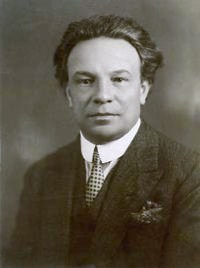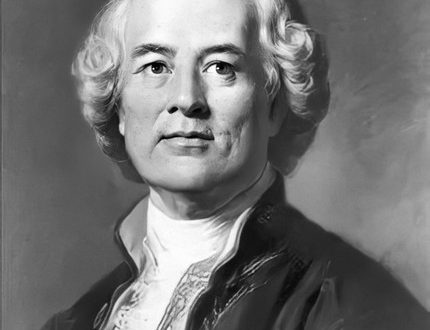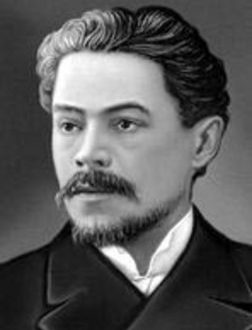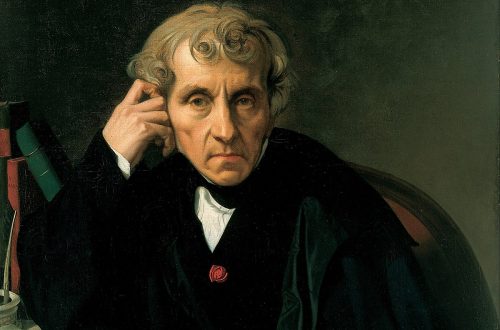
Ottorino Respighi (Ottorino Respighi) |
Ottorino Respighi
In the history of Italian music in the first half of the XNUMXth century. Respighi entered as the author of bright program symphonic works (poems “Roman Fountains”, “Pins of Rome”).
The future composer was born into a family of musicians. His grandfather was an organist, his father was a pianist, he had Respighi and took his first piano lessons. In 1891-99. Respighi studies at the Music Lyceum in Bologna: playing the violin with F. Sarti, counterpoint and fugue with Dall Olio, composition with L. Torqua and J. Martucci. Since 1899 he has performed in concerts as a violinist. In 1900 he wrote one of his first compositions – “Symphonic Variations” for orchestra.
In 1901, as a violinist in the orchestra, Respighi came on tour to St. Petersburg with an Italian opera troupe. Here is a significant meeting with N. Rimsky-Korsakov. The venerable Russian composer coldly greeted the unfamiliar visitor, but after looking at his score, he became interested and agreed to study with the young Italian. The classes lasted 5 months. Under the direction of Rimsky-Korsakov, Respighi wrote Prelude, Chorale and Fugue for orchestra. This essay became his graduation work at the Bologna Lyceum, and his teacher Martucci noted: “Respighi is no longer a student, but a master.” Despite this, the composer continued to improve: in 1902 he took composition lessons from M. Bruch in Berlin. A year later, Respighi again visits Russia with the opera troupe, lives in St. Petersburg and Moscow. Having mastered the Russian language, he gets acquainted with the artistic life of these cities with interest, highly appreciating Moscow opera and ballet performances with scenery and costumes by K. Korovin and L. Bakst. Ties with Russia do not stop even after returning to their homeland. A. Lunacharsky studied at the University of Bologna, who later, in the 20s, expressed the wish that Respighi would come to Russia again.
Respighi is one of the first Italian composers to rediscover half-forgotten pages of Italian music. In the early 1900s he creates a new orchestration of “Ariadne’s Lament” by C. Monteverdi, and the composition is successfully performed at the Berlin Philharmonic.
In 1914, Respighi is already the author of three operas, but work in this area does not bring him success. On the other hand, the creation of the symphonic poem The Fountains of Rome (1917) put the composer in the forefront of Italian musicians. This is the first part of a kind of symphonic trilogy: The Fountains of Rome, The Pines of Rome (1924) and The Feasts of Rome (1928). G. Puccini, who knew the composer closely and was friends with him, said: “Do you know who is the first to study Respighi’s scores? I. From the Ricordi publishing house I receive the first copy of each of his new scores and more and more admire his unsurpassed art of instrumentation.
Acquaintance with I. Stravinsky, S. Diaghilev, M. Fokin and V. Nijinsky was of great importance for Respighi’s work. In 1919 Diaghilev’s troupe staged in London his ballet The Miracle Shop, based on the music of piano pieces by G. Rossini.
Since 1921, Respighi has often performed as a conductor, performing his own compositions, touring as a pianist in Europe, the USA, and Brazil. From 1913 until the end of his life, he taught at the Academy of Santa Cecilia in Rome, and in 1924-26. is its director.
Respighi’s symphonic work uniquely combines modern writing techniques, colorful orchestration (the aforementioned symphonic trilogy, “Brazilian Impressions”), and an inclination towards archaic melody, ancient forms, i.e. elements of neoclassicism. A number of the composer’s works were written on the themes of Gregorian chant (“Gregorian Concerto” for violin, “Concerto in Mixolydian mode” and 3 preludes on Gregorian melodies for piano, “Doria Quartet”). Respighi owns free arrangements of the operas “The Servant-Madam” by G. Pergolesi, “Female Tricks” by D. Cimarosa, “Orpheus” by C. Monteverdi and other works by ancient Italian composers, orchestration of five “Etudes-Paintings” by S. Rachmaninov, an organ passacaglia in C minor J. S. Bach.
V. Ilyeva
- List of major works by Respighi →





